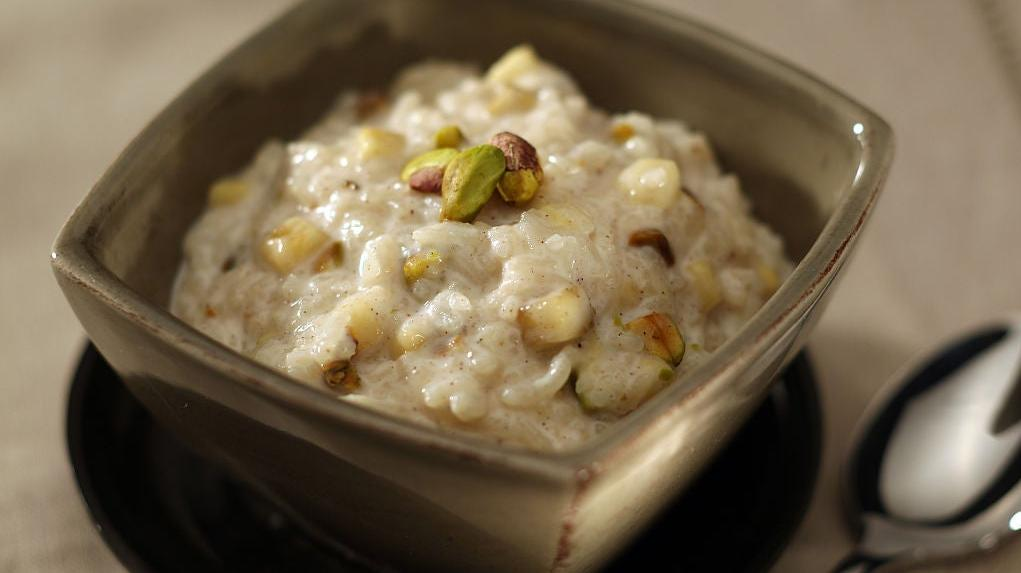After A Day-Long Ramadan Fast, Sometimes You Just Want A Decadent Dessert
Eleven months out of the year, the Arab-American coffee shops, restaurants, and bakeries of Dearborn, Michigan, bustle with business throughout the day. But when the holy month of Ramadan arrives, daylight activity in the area slows down. Observant Muslims fast from sunrise to sunset during Ramadan, which began this year on April 12 and will end May 12.
When night falls, and the fast is broken, however, Dearborn's many eateries come alive again.
In the Detroit area, the sun sets at this time of year around 8:30 p.m. and rises at 6:30 a.m., meaning that dining—and sleep—have to fit into those 10 hours. Many Muslims divide their eating between the post-fast meal, called iftar, and a pre-fast breakfast, called suhoor. For a number of places, that means adjusting the usual operating times.
Cheat Treat Cafe, which has an eye-popping variety of pastries and sweet concoctions, opens at 6:30 p.m. and closes at 3 a.m. Qahwah House, which specializes in Yemeni coffee and sweets, stays open until 2 a.m., serving dates to customers and staff to break the fast and kick off iftar.
"We see activity shifting, so we move our workforce for the evening hours, rather than the morning," says Nada Shatila, vice president at her family's Shatila Bakery, which operates until 11 p.m. during the week and midnight on Friday and Saturday.
Shatila, about a 15-minute drive west of downtown Detroit, is a vast wonderland of desserts, including house-made ice cream and pomegranate-juice-based soft drinks. French pastry and custom-designed cakes nod to the family's Lebanese heritage, along with individually wrapped chocolates, often eaten with strong Arabic coffee that's also available for sale.
But the real stars of Shatila are its savory and sweet Middle Eastern pastries, many of which can be purchased through mail order (it sells on its own website and via Goldbelly). You'll have to arrive in person, however, to sample the one thing that customers clamor for most often during the holiday: atayef.

To reward themselves after the fast, "people want a super decadent dessert," Nada Shatila explains. Atayef (also spelled katayef) are small spongy pancakes fried on one side until firm, then folded to form a little boat, filled with ashta cream, similar to clotted cream or British double cream, and flavored with rosewater. Basic atayef contain just cream, while others are topped with pistachios. Shatila also offers atayef laced with Nutella and strawberries. The bakery sells between 2,400 and 3,600 atayef per day.
While it's possible to prepare atayef at home (Shatila will sell the pancake batter and cream by special order), most people prefer to buy them ready-made.
A more accessible dessert for home cooks is Shatila's rice pudding, which it sells year-round, but which is especially popular during Ramadan. Richer than typical American rice puddings, this concoction, which Nada Shatila describes as "super filling," is a fixture at the pre-dawn suhoor meal, to fill the tummy before the fast resumes.
Shatila's version, which costs $2.25 a serving, is topped with rosewater, which the shop sells, along with orange blossom water and the simple syrup that is poured over some of its pastries.
Shatila makes it in vast quantities, since it sells dozens of cups a day, but Nada Shatila says this recipe will yield a family-sized serving.
Shatila’s Rice Pudding
- 4 cups of whole milk or 2% milk (see the note below about plant-based milks)
- 4 Tbsp. cornstarch
- 4 Tbsp. medium-grain rice, rinsed
- 1 cup water
- 6 Tbsp. sugar
- 3/4 tsp. rosewater
- 3/4 tsp. orange blossom water
- 4 Tbsp. shelled pistachios, chopped
In a bowl, combine 1/2 cup milk with the cornstarch to make a thickened mixture. Set it aside.
Bring the rice and water to a boil. Cover, lower to a simmer, and cook for 12 minutes. In another saucepan, combine the remaining 3 1/2 cups milk and sugar over medium heat and cook until the sugar is melted. Turn off the heat.
Add the warmed milk-sugar mixture to the cooked rice. Stir thoroughly, cover, and cook 5 minutes over low heat. Add the cornstarch and milk mixture and let it come to a boil. Let it cook 3 minutes, then take it off the heat and stir in the rose and orange blossom waters.
Divide the pudding into 6 serving cups, or 4 larger ones. Let it cool to room temperature, then put it in the fridge. Before serving, top with chopped pistachios.
Notes
If you don't like the flower waters, you can substitute 1 teaspoon of cinnamon or 1 teaspoon of vanilla.
This is not an ideal recipe for skim or alternative milks, which tend to be thinner than cow's milk, but if you want to try them, add another tablespoon of cornstarch.
